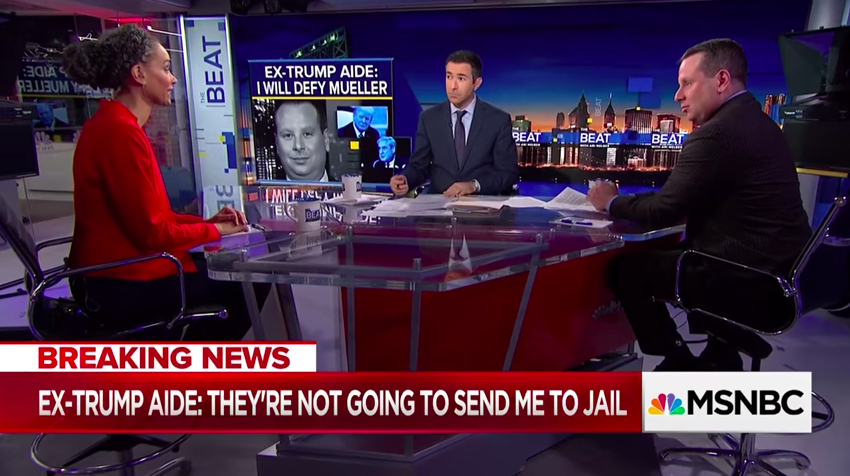
Trump Aide Sam Nunberg Had a Change of Heart on Complying with Mueller — He Has Maya Wiley to Thank for it
By the time he appeared on MSNBC on Monday evening, it seemed no one could save Sam Nunberg from Sam Nunberg.
The former Trump campaign aide spent the day on a wild media spree, saying over and over again that he would refuse to comply with a subpoena from Special Counsel Robert Mueller to go in front of a federal grand jury investigating Russia’s interference in the 2016 presidential election.
“Let him arrest me,” a defiant Nunberg told The Washington Post. He reiterated that sentiment in a frenzy of interviews on Bloomberg News, CNN, NY1, Vox, and Yahoo News.
Then, around midnight, he had a whiplash-inducing change of heart.
“Of course, I’m going to cooperate!” he told New York magazine.
Who does he have to thank for showing him the light? None other than Maya Wiley, The New School’s senior vice president for social justice, Henry Cohen Professor of Urban Policy and Management at the Milano School, and a lawyer by profession.
In a segment that at times felt like an intervention, Wiley, a legal analyst for MSNBC, listened patiently as Nunberg expressed incredulity over the consequences of failing to comply with Mueller’s subpoena.
“I’m not going to jail, come on,” Nunberg said, as Wiley shook her head. “Do you think I’m going to jail?”
She told him point blank: “I think your family wants you home for Thanksgiving, and I think you should testify.” She pointed out that if Mueller had offered him immunity, as Nunberg said, he personally didn’t have any reason not to testify. Then she noted that failing to testify would be a disservice to his self-described mentor, Roger Stone.
“It actually makes it appear that Roger Stone has something to hide because you will not go testify,” Wiley said.
As for Nunberg’s complaints about how much time complying with the subpoena would take, Wiley asked him a question for which there was only one logical answer.
“You’d rather possibly spend a year in jail than spend 80 hours going through emails?” she asked.
In a follow-up interview with The Washington Post Nunberg credited Wiley with changing his mind, describing her as “very, very smart.”
“She made a compelling case to me,” he said.
The interaction could have easily gone a different, much testier, way. As Nunberg himself noted during the MSNBC interview, he had been fired from the Trump campaign in 2015 after racially charged Facebook posts he allegedly wrote came to light. Wiley, a nationally recognized racial justice activist, could have “taken my bite out of Nunberg like everyone else,” she said. Instead, she chose to help him.
“I’m a lawyer by profession, an academic by vocation and a racial justice crusader by mission, but I’m no saint,” Wiley later wrote in Buzzfeed. “He was spewing his arrogant, privileged contempt for our legal process, and is notorious for racially charged language, so I felt more than happy to do some damage.”
“Instead,” she added, “some now call what happened that night a form of free legal counsel.”
Wiley said it was Nunberg’s father’s concern for his son’s well-being that led her to lend a helping hand rather than deal a crushing blow.
“At that moment, I saw Nunberg as a son, not a son of a bitch,” wrote Wiley, who recalled watching her father, a civil rights and economic justice organizer, die when she was nine. “I started talking to him as if he was sitting in my kitchen. What I wouldn’t give to have my father here to be concerned for my well-being; to guide me in racially charged and divisive times, when our country has lost so much of the ground that he fought for.”
“It didn’t mean I felt sorry for Nunberg. I don’t,” she continued. “Some have called what I did ‘compassionate,’ and maybe that’s the word for it. But real human connection? Yes, it was that. And I am reinvigorated by it — by the privilege of being on TV to create a conversation around what matters.”
Wiley reflected on the “unique situation” later in the week on Comedy Central’s “The Opposition with Jordan Klepper.”
When asked by Klepper why she didn’t “go for the jugular,” Wiley responded, “Cause he’s a human.”
“I finally realized this poor guy was having a really really hard time and wasn’t actually thinking through what he was doing and what impact it was going to have on him and his family,” Wiley said, adding, “It’s so important that we as a country actually figure out a way to come together, and talk to one another, and really find a way to find some common ground.”